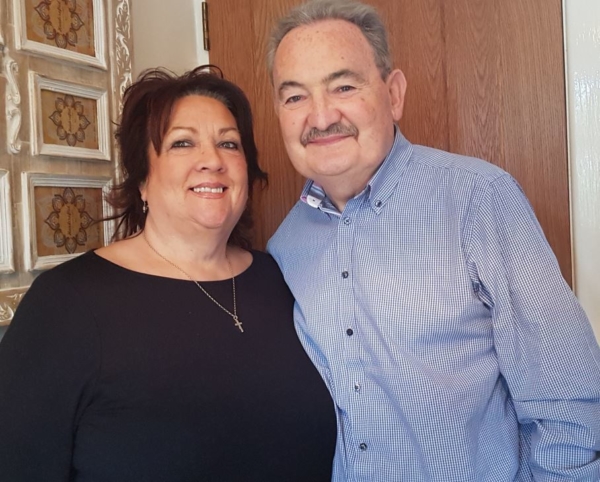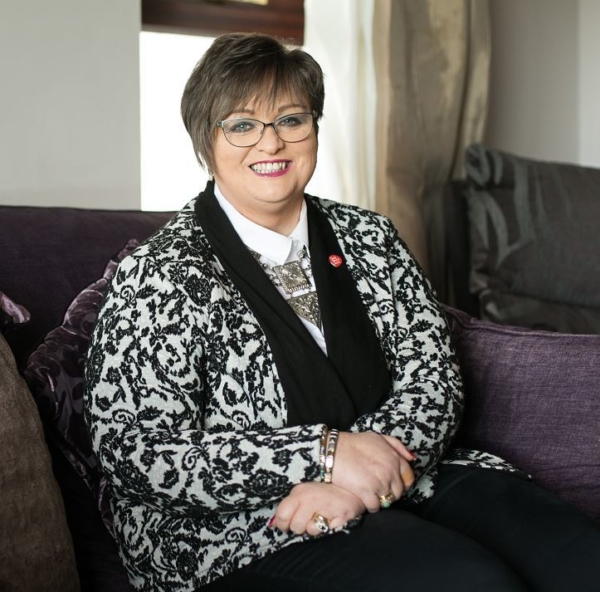Local health charity Northern Ireland Chest Heart & Stroke is funding a unique research project which is hoping to provide vital support for families affected by heart failure, in particular for loved ones who may be thrust overnight into a carer’s role.
Heart failure is becoming more common largely due to people living longer and improved treatment and survival from heart disease. 17,402 people are currently living with heart failure in Northern Ireland and this figure has dramatically risen by 25% in the past 9 years.
Fidelma Carter, Public Health Director for NICHS, explains how heart failure affects not only the patient, but also the carer: “Heart failure is a very disabling condition with symptoms of breathlessness, fluid retention and tiredness. Managing the condition can be complicated and patients often need a lot of support from carers. Sadly, almost half of all patients will die within 4 years.
“International research has shown that, given a choice, most people would prefer to be cared for and die at home. Within Northern Ireland, the Transforming Your Care agenda emphasises the importance of care in the community, but in order to facilitate this, carers require support.
“Heart failure patients are often cared for at home by relatives of a similar age who have their own health problems and whose quality of life can be severely reduced by their caring responsibilities. Unfortunately, both patients and carers can have difficulty accessing support and palliative care, because their needs are not recognised early enough and because palliative care tends to be focused more towards cancer.
“The research NICHS is funding aims to develop a support mechanism for carers allowing them to get the most out of every day with their loved one, and keep them comfortable.”
Helen Chivers from Bangor was a carer for her husband Harry for four years until he had a heart transplant earlier this year. “You never know when life will change. I never expected to become a carer and the job was made so much worse by the constant fear that if his heart failed, I might fail him too. I know for those four years I barely slept as I was too scared to let Harry out of my sight. Having this support would have made such a difference to me. I know it will make a difference to other carers in the future.”
To donate to NICHS’s Christmas appeal and help support outstanding local research call 028 9032 0184 or visit www.nichs.org.uk/donate
We spoke to two families who understand the impact of heart failure.
“The research NICHS is funding aims to develop a support mechanism for carers allowing them to get the most out of every day with their loved one, and keep them comfortable.”
Fidelma Carter, Public Health Director for NICHS
Helen Chivers from Bangor was a carer for her husband Harry for four years until he had a heart transplant earlier this year. “You never know when life will change. I never expected to become a carer and the job was made so much worse by the constant fear that if his heart failed, I might fail him too. I know for those four years I barely slept as I was too scared to let Harry out of my sight. Having this support would have made such a difference to me. I know it will make a difference to other carers in the future.”
To donate to NICHS’s Christmas appeal and help support outstanding local research call 028 9032 0184 or visit www.nichs.org.uk/donate
We spoke to two families who understand the impact of heart failure.

Helen and Harry’s story
“I never expected to become a carer and the job was made so much worse by the constant fear that if his heart failed, I might fail him too.”
“It was a sunny August day in 2014 when life changed forever. Harry was 62 and had just retired. We were full of plans for travelling and spending time together. I had just turned 60 but was still working part-time at Marks & Spencer because I loved it so much. I’d been there for 22 years so it really felt more like my social life than a job!
“That morning Harry told me he wasn’t feeling great, but I went to work, leaving him with a bottle of Gaviscon, thinking he had indigestion. Near the end of my shift, our daughter rang. By then Harry was much worse, so I called an ambulance and left work to go to the hospital.
“I never imagined when I walked out the doors of M&S that day, that I would never go back.
“Harry had had a massive heart attack and was fitted with 9 stents, but they couldn’t support the damage already done.
“Overnight I went from being a shop assistant to becoming a full-time carer and nurse of a seriously ill heart failure patient. But unlike learning to manage a till and the shop floor, I received no training for this critical job.
“Harry was then fitted with a ventricular assisted device (MVAD) – a little machine with a big job – to keep Harry’s heart pumping. He was the first person in the world to have one of its kind. We became the guinea pigs and while the medical team was amazing, it was a lot for me to learn and manage. Alarms would go off and I was always aware I had to be the first responder to any issue Harry had.
“When Harry came home from the hospital two weeks later, he was so breathless he could hardly get upstairs. It was so terrifying to know how fragile his life had become. I would lie awake at night listening to every move he made, worrying in case something went wrong. Every day I had to change his dressings, help him get washed and dressed, and regularly monitor his temperature for signs of infection. I also had to take over every single job in the house, including gardening and taking out the bins. It was exhausting and overwhelming.
“I know for those four years I barely slept as I was so scared to let Harry out of my sight. Having the type of support the NICHS funded research will develop would have made such a difference to me. I was constantly waiting for him to have another heart attack and die in front of me. It was so hard, but I just had to get on with it.
“Devastatingly, during this time, our beautiful daughter Jody, was diagnosed with cancer, and last November she passed away at the age of 40. At the same time Harry was also deteriorating and was only just able to attend her funeral.
“We were told he would be dead in six months unless he received an emergency heart transplant. We will always be so grateful for the donor heart we received nine weeks later. Someone else’s loss gave Harry and I our lives back.
“Now he is doing really well. I can leave him alone again and go to sleep at night not listening to his breathing; he is also back to taking out the bins again!
“But you never know when life will change. I never expected to become a carer and the job was made so much worse by the constant fear that if his heart failed, I might fail him too.
“Harry was so fortunate to receive a new heart, and I am fortunate that I am no longer his carer. But having been one for four years I understand what it means to literally ‘hold someone’s heart in your hands’. That’s why I am so relieved that thanks to NICHS funded research, carers like me in the future will receive much-needed guidance and support. Carers will be better equipped with knowledge and access to medical experts so the burden of care will be lessened.
“Please join me in supporting NICHS’s research appeal this Christmas. Your gift can change lives, and that’s a very special gift to give.”

Wendy’s story
“To be honest, I haven’t really thought about potentially needing a carer in the future, but I know that the research that NICHS is funding will be very important for me in the years that lie ahead.”
“I was diagnosed with AF (atrial fibrillation) with dilated cardiomyopathy and heart failure when I was only 42 years old.
“I was working full time as a warehouse and distribution supervisor but hadn’t been feeling well so I went to the doctor. Something was just not right. My stomach felt upset and I was breathless when going up stairs.
“My GP thought maybe it was stress causing the symptoms but to be on the safe side, decided I needed an ECG. When I had the ECG, I was told to go straight to A&E. But it was my son, Ross’s 6th birthday party on the Saturday so I told the doctor I couldn’t go right then. I suppose, like most women, my family came first, even before my own health. The doctor wasn’t happy but couldn’t make me go. I promised I would go after Saturday.
“However, that night, at around 3.20am, I woke with my heart racing. I woke my husband, David, and we got a neighbour to look after our son and went to A&E.
“When we got there, I was seen immediately. I told them I needed to be back out by 6.30am to get home and get my son to school. They looked at me like I was mad! Instead I was taken to coronary care where I was diagnosed with AF (atrial fibrillation) with dilated cardiomyopathy and heart failure.
“I had to give up work as my heart condition made me too tired to work full time. I suffer from breathlessness. Walking on the level is fine. If I am walking upstairs, the first flight is okay but the second is hard.
“In 2009, my husband David passed away. He was diagnosed with cancer on the 1st May, but had a massive coronary on the 12th May. He had no symptoms at all. It just suddenly came on and he died in front of me. I was left having to look after the house, our son and everything by myself.
“Coping with his death and raising my son alone would be difficult anyway, but my heart problems have added an extra challenge. Ross is 20 now and in his third year at Queen’s University. He is well aware of my condition and I believe his being aware of my diagnosis from an early age has made him a mature young man. I am so proud of him.
“To be honest, though, I haven’t really thought about potentially needing a carer in the future. It’s a scary thought. However I would definitely not want Ross to become my carer. He has his own life to lead. I truly would wish him every blessing in whatever he decides to do, however I do know he will always be there for me.
“The research that NICHS is funding to develop a support mechanism for carers of people with heart failure will be very important in the years that lie ahead. As I really do not know what the future holds, this would provide peace of mind to a lot of people like myself who have heart failure.”
